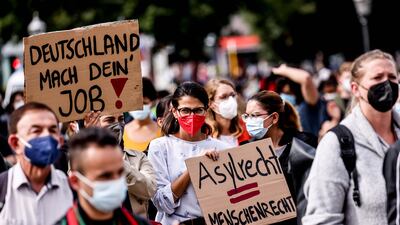Parties running in the German election have put forward a “caricature” of migration policy with too much emphasis on asylum and refugees, analysts have said.
The vote on September 26 comes amid fears of a refugee crisis in Afghanistan, and is the first election since a backlash over the influx from Syria propelled the far-right Alternative for Germany (AfD) into parliament.
The AfD and the centre-right Christian Democrats want to keep refugee numbers down, while other parties such as the Greens are more open to asylum.
Experts at the Kiel Institute for the World Economy (IfW), a leading think tank, said there had been too little focus on the economic migrants that Germany needs.
The head of the federal labour service recently said that 400,000 newcomers a year were needed in order to plug gaps in the workforce.
But analysing the manifestos of the major parties, IfW experts found that at least three quarters of migration-related pledges were to do with asylum and refugees.
“All parties overemphasise refugee flows and asylum in their manifestos,” said the analysts, Tobias Heidland und Finja Krueger. “Many of the party manifestos offer a caricature.
“An opportunity-orientated immigration policy is urgently needed in view of the rapid ageing of society and the growing shortage of skilled workers.
“In many areas, the election manifestos are unspecific and offer hardly any concrete proposals.”

Despite the focus on refugees, asylum seekers accounted for only 10 per cent of migration to Germany in 2019 and 2020, analysts said.
They said the vagueness of some pledges may at least make it easier to form a coalition after the election. No party is likely to win a majority.
Chancellor Angela Merkel, the face of her country’s open-door policy during the 2015 refugee crisis, is not seeking another term in power.
Armin Laschet, her party’s nominee to replace her, has emphasised that there must be no repeat of what happened in 2015. The party manifesto promises efforts to ensure that refugee numbers “do not only stay permanently low, but are further reduced”.
A passage on economic migration describes it as an opportunity for Germany “when it is accompanied by successful integration”.
It says the government must distinguish between people in need and those who should be removed from Germany because they do not need protection.
The Social Democrats, whose candidate Olaf Scholz is riding high in the polls, want more asylum policy to be handled by the EU.
They promise to tackle discrimination against migrants and strengthen German language teaching for new arrivals.
The IfW experts said both parties appeared to be content with current rules on economic migration, since they do not suggest any concrete changes.
This is despite the current rules being too rigid and complex for Germany to attract a suitable number of workers, in the IfW's view.

A Green manifesto promises quick decisions on asylum applications and an easier route to obtaining German citizenship.
It says immigration should be made easier through faster recognition of foreign degrees and professional qualifications.
The AfD is promising a tougher line, with refugees banned from bringing their families to Germany and a 10-year waiting period for permanent residency.
The party rejects talk of labour shortages, saying only skilled migrants should be allowed to come to Germany.
Arrivals from Afghanistan have been a major topic of discussion in recent days. Hundreds of Afghans were airlifted out of Kabul after the Taliban took control.
Ministers says they want to bring more people to Germany if they can persuade the Taliban to let them out or negotiate safe passage via third countries.


